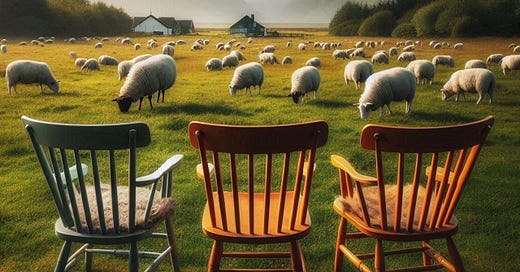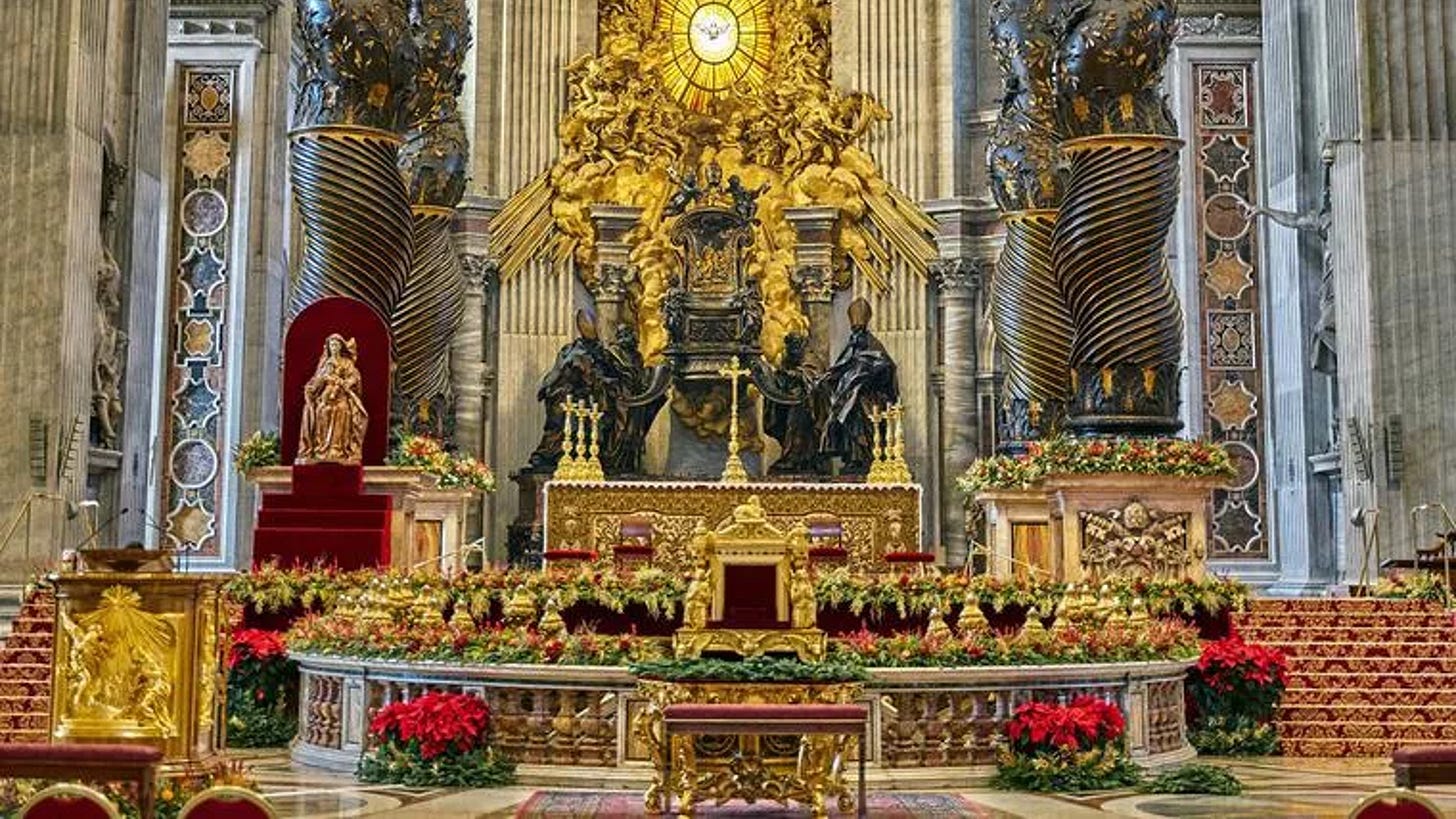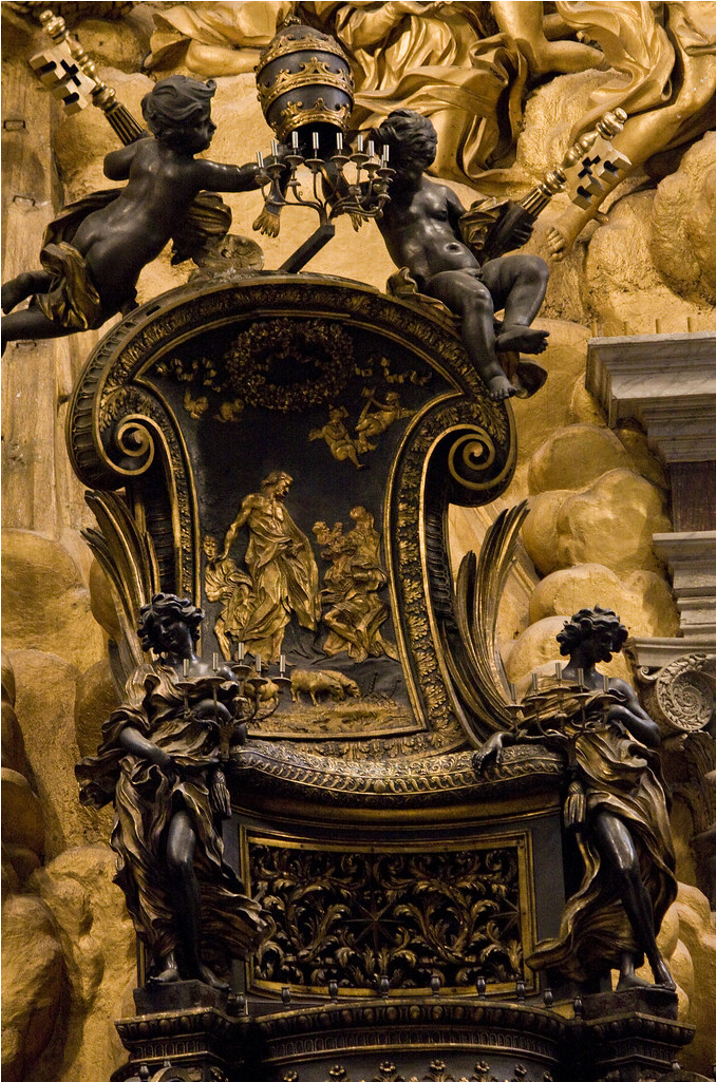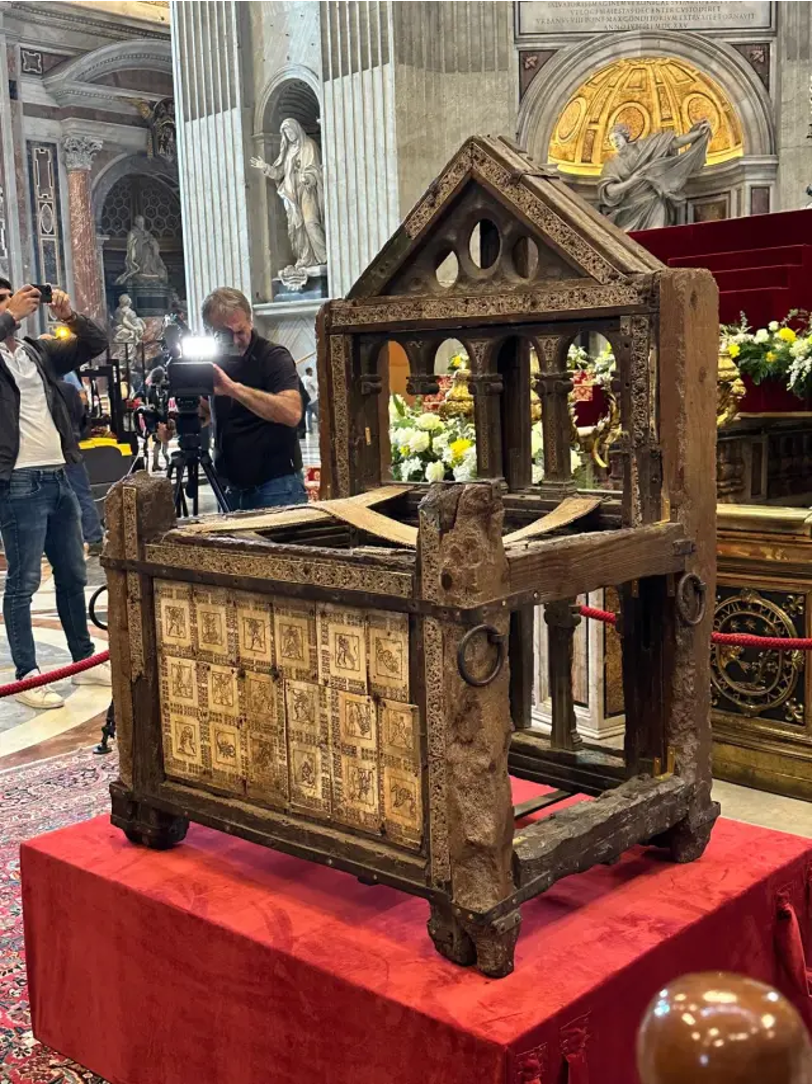It might be easy to drift off into a pastoral scene of sheep and lambs grazing in “verdant pastures”. Maybe we could even sit down, for today is the Feast of the Chair of St. Peter, Apostle. But what is the “Chair of St. Peter”? It turns out there are THREE chairs in this story.
Feast of the Chair of Saint Peter, Apostle
1 Peter 5:1-4
Matthew 16:13-19
The Psalm and Gospel readings for today are VERY familiar to most churchgoers. The 23rd Psalm starts with “The LORD is my shepherd; I shall not want . . .” and the Gospel from Matthew 16 recounts Peter’s answer when Jesus asks, “But who do you say I am?”
Add to that the first reading from 1 Peter “exhorting” his “fellow presbyters” to tend their flocks and lead by example.
It might be easy to drift off into a pastoral scene of sheep and lambs grazing in “verdant pastures”. Maybe we could even sit down, for today is the Feast of the Chair of St. Peter, Apostle.
OK, that’s not ordinary – it’s a Feast. We know a lot about Peter, a staple in the New Testament. But what is the “Chair of St. Peter”? It turns out there are THREE chairs in this story.
Let’s dive a little deeper into today’s readings.
The first reading is from the First Epistle of Peter. The letter was generally addressed to gentile Christians in Asia Minor, now the western half of Turkey. The reading for February 22 is at the beginning of the last chapter and was explicitly addressed to the local “presbyters,” the officially appointed leaders and teachers of the Christian community. We might consider them to be early parish priests.
Beloved:
I exhort the presbyters among you,
as a fellow presbyter and witness to the sufferings of Christ
and one who has a share in the glory to be revealed.
Tend the flock of God in your midst,
overseeing not by constraint but willingly,
as God would have it, not for shameful profit but eagerly.
Do not lord it over those assigned to you,
but be examples to the flock.
And when the chief Shepherd is revealed,
you will receive the unfading crown of glory. [1 Peter 5:1-4]
The main point Peter makes is to “tend the flock of God in your midst” and “be (a good) example to the flock” so that each early leader will “receive the crown of glory when the chief Shepherd is revealed”.
This is an excellent example of Peter being an example.
NOT today’s gospel
In the last chapter of the Gospel of John, we hear the story of the disciples not being very successful, having returned from being fishers of men to their previous occupation of fishers of fish (fishermen, as we would call them). The unrecognized Jesus suggests that they cast their nets one more time. You know the story: LOTS of fish! The disciples recognize that Jesus is on the shore. This is the third time Jesus was revealed to his disciples after being raised from the dead.
As you will recall, Peter had denied Jesus 3 times before the crucifixion, and it wasn’t clear that he was back in “good graces” with the Risen Lord. The Gospel continues:
When they had finished breakfast, Jesus said to Simon Peter, “Simon, son of John, do you love me more than these?” He said to him, “Yes, Lord, you know that I love you.” He said to him, “Feed my lambs.”
He then said to him a second time, “Simon, son of John, do you love me?” He said to him, “Yes, Lord, you know that I love you.” He said to him, “Tend my sheep.”
He said to him the third time, “Simon, son of John, do you love me?” Peter was distressed that he had said to him a third time, “Do you love me?” and he said to him, “Lord, you know everything; you know that I love you.” [Jesus] said to him, “Feed my sheep.” [John 21:15-17]
Do parts of this sound like the reading from 1st Peter? Just as Jesus directed Peter to feed his lambs, tend his sheep, and feed his sheep, Peter also charged his fellow presbyters to “tend the flock of God in your midst.”
Peter has been redeemed and can now reclaim the keys to the kingdom. What??
Back to today’s readings
Let us continue today’s readings with Psalm 23. The Davidic Psalm starts with “The Lord is my shepherd, I shall not want… ” The “I shall not want” means “there is nothing I lack”; God is caring for or shepherding me. The whole psalm expresses the loving care we witness as sheep being led, fed, and cared for by a loving God. Just like everything Jesus instructed Peter to do.
Today’s gospel reading happens shortly after feeding the 4000 and some less-than-productive dialog with the Pharisees and Sadducees.
When Jesus went into the region of Caesarea Philippi
he asked his disciples,
“Who do people say that the Son of Man is?”
They replied, “Some say John the Baptist, others Elijah,
still others Jeremiah or one of the prophets.”
He said to them, “But who do you say that I am?”
Simon Peter said in reply,
“You are the Christ, the Son of the living God.”
Jesus said to him in reply, “Blessed are you, Simon son of Jonah.
For flesh and blood has not revealed this to you, but my heavenly Father.
And so I say to you, you are Peter,
and upon this rock I will build my Church,
and the gates of the netherworld shall not prevail against it.
I will give you the keys to the Kingdom of heaven.
Whatever you bind on earth shall be bound in heaven;
and whatever you loose on earth shall be loosed in heaven.” [Matthew 16:13-19]
This was a test of sorts. “But who do you say that I am?”
Peter did not wait in awkward silence but instead replied, “You are the Christ, the Son of the living God.” This was not a talking point in any of Jesus’ sermons. No one other than John the Baptist and Mary, the mother of the Lord, knew this. It must have been revealed to Peter by God, the heavenly Father. Jesus at that moment puts Peter in charge.
“You are Peter,
and upon this rock I will build my Church,
and the gates of the netherworld shall not prevail against it.
I will give you the keys to the Kingdom of heaven.
Whatever you bind on earth shall be bound in heaven;
and whatever you loose on earth shall be loosed in heaven.”
Jesus will give Peter “the keys to the Kingdom of heaven” and the power to make binding decisions regarding the use of said keys. This might be the shortest job description ever. It is, in essence, the role of the Pope as we know it today. The Chairman, or Chair, of the church. The leader, example, and shepherd.
Do you remember how we started down this rabbit hole? Today’s readings are for the Feast of the Chair of St. Peter, Apostle. So here we are. During this feast, we are celebrating the office of the Pope and the lineage of all popes from when Peter was the bishop of Rome.
But I started with a teaser that this feast actually has three chairs. The following two chairs in this feast are in St. Peter's Basilica, Vatican City.
If you were to look beyond the second altar to the back of the Basilica, you would see a sculpted gilt bronze oversized chair or throne designed by Gian Lorenzo Bernini and constructed between 1647 and 1653. In 2012, Pope Benedict XVI described the chair as "a symbol of the special mission of Peter and his Successors to tend Christ's flock, keeping it united in faith and in charity." The back of the chair has a relief depicting Jesus instructing Peter to feed and tend his sheep.
Words don’t do it justice. It’s about 7 meters (23 feet or so) tall. Too tall to actually sit in. Its primary purpose was to honor and protect the item inside
.
This way-oversized throne is a reliquary or a container for a relic. So, what’s inside? The Chair of St. Peter is the “third chair” in today’s celebration
The relic is described as an oaken chair damaged by cuts and worms. Missing pieces are thought to have been removed as relics. The chair has metal rings attached to each side, allowing poles to be inserted to carry the chair and its occupant on the shoulders.
The wooden throne was a gift from Emperor of the Romans, Charles the Bald, to Pope John VIII in 875. It has been studied many times over the years, most recently between 1968 and 1974. The study concluded that it was not a double but a single chair with a covering and that the oldest parts are from the 6th century.
There you have it. We have two physical reminders, both chairs, of St. Peter and his founding service to the church, and we celebrate him as the first pope and the continuing office of the papacy. Three chairs for today’s feast. The popes have been the shepherd for God’s flock for almost 2000 years.








